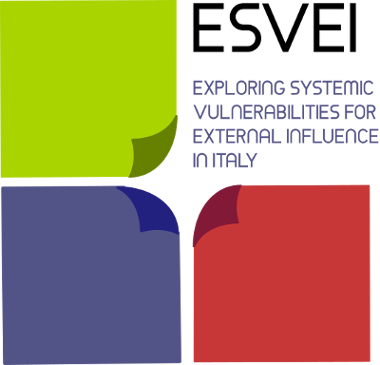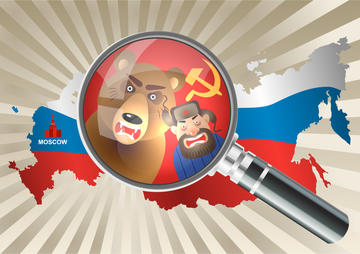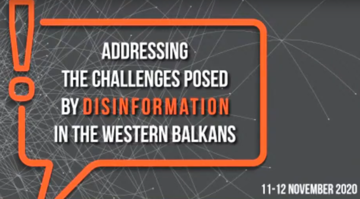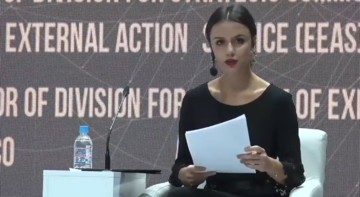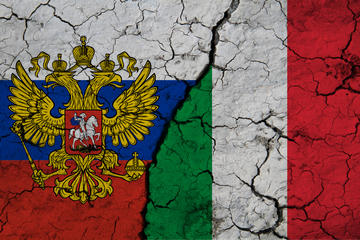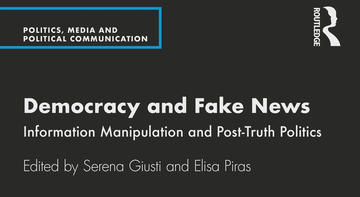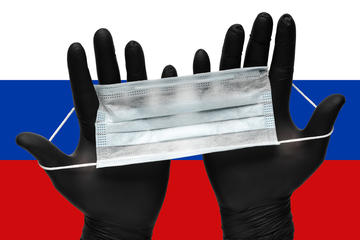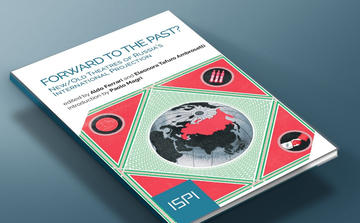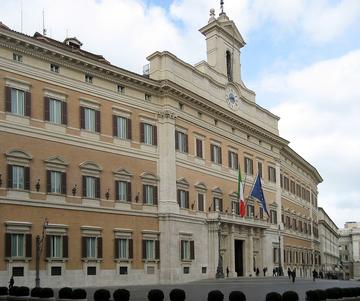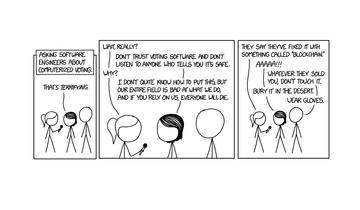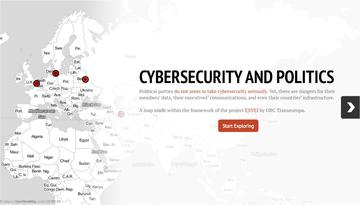ESVEI tackles structural issues that in recent years are increasing the vulnerability to external interference of democratic processes, taking Italy as a case study.
It aims at increasing awareness, initiating policy debates, and providing sensible, forward-looking policy recommendations in three domains that are central to democratic processes in modern societies, but that, due to inadequate regulations and poor practices, needlessly expose such processes to meddling:
social media and disinformation;
transparency of funding and lobbying;
cybersecurity
|
Go to: |
Go to: |
Go to: |
In depth
EUROPE EU takes its best action against foreign interference when tackling the big issues
Giorgio Comai | 22/12/2020A swirl of new acts and strategies has been announced in the last couple of weeks by the European Commission, including the European Democracy Action Plan, the Digital Markets Act, and the EU’s Cybersecurity Strategy. If we ask the right questions about foreign interference, these are all part of the answer
MEDIA "The Russians": the theme of Russian interference in TV series
Irene Dioli | 17/12/2020In recent years, Russia has been increasingly present in the West's hearts, minds, and debates, including in cultural production. Here we talk about three famous television series that brought the theme of Russian interference in the political life of Western countries onto the small screen
MEDIA EU, Russia, and the tug-of-war on disinformation
Elisa Piras | 15/12/2020With the growing concerns about disinformation activities by Russia and China, the EU and - to varying degress - individual countries have shown increasing interest and initiative in the area of propaganda and strategic communication
Addressing the challenges posed by disinformation in the Western Balkans. Day 2
14/12/2020More than 100 participants, representatives of regional organisations, governmental institutions and media have gathered for a two-day online conference on 11-12 November 2020 co-organised jointly by the Regional Cooperation Council (RCC), Osservatorio Balcani Caucaso Transeuropa (OBCT), the European Center of Excellence for Countering Hybrid Threats (Hybrid CoE) and the European External Action Service (EEAS) in order to discuss challenges posed by disinformation in the Western Balkans. Day 2
Addressing the challenges posed by disinformation in the Western Balkans. Day 1
14/12/2020More than 100 participants, representatives of regional organisations, governmental institutions and media have gathered for a two-day online conference on 11-12 November 2020 co-organised jointly by the Regional Cooperation Council (RCC), Osservatorio Balcani Caucaso Transeuropa (OBCT), the European Center of Excellence for Countering Hybrid Threats (Hybrid CoE) and the European External Action Service (EEAS) in order to discuss challenges posed by disinformation in the Western Balkans. Day 1
ANALYSIS Cybersecurity, technology, and democracy: what should be done?
Giorgio Comai | 10/12/2020In Italy, similarly to other European countries, there is basically no structured initiative aimed at increasing the cybersecurity of the key actors of our democratic system. New measures are needed that do not entail increasing dependence on a small number of tech companies: cybersecurity in politics cannot exist independently of politics
ANALYSIS The risk of fallacy: assessing the impact of fake news on democratic politics
Serena Giusti, Elisa Piras | 30/11/2020Elections and crises are ideal contexts for the festering of misinformation and disinformation. This is what makes fake news a useful tactic in influence operations. Assessing the actual impact of disinformation must now be a priority in the research agenda
ANALYSIS Go West: Russia’s soft power in Europe
Eleonora Tafuro Ambrosetti | 25/11/2020Anti-Western rhetoric, social conservatism, and assertiveness are some of the key elements that make Russian narratives attractive, credible, and legitimate in different quarters across Europe. A journey through Russia’s soft power in Europe by ISPI researcher Eleonora Tafuro Ambrosetti
COMMENT Between international crises and domestic controversies: Italy's relations with Russia
Marco Siddi | 18/11/2020Post-Soviet Russia has become an important trade and energy partner for Italy. After the Ukrainian crisis, (geo)political divergences have greatly affected bilateral relations
Responding to Alleged Russian Interference by Focusing on the Vulnerabilities That Make It Possible
Giorgio Comai | 3/11/2020Russian interference: This chapter by Giorgio Comai looks at the debates on Russian interference in the democratic processes of the West, highlighting the need for finding policy responses to the structural vulnerabilities exposed by alleged Russian interference
ESVEI “Russia” as a source of concern: are we really talking about Russia?
Giorgio Comai | 21/10/2020What do we even mean when expressing concern about “Russia”? As it turns out, Russia can be both a symbol and an external actor able to influence domestic processes. It is important to resist the temptation to conflate different preoccupations
ESVEI Cybersecurity dictionary
Niccolò Caranti | 30/7/2020A cybersecurity glossary made in the framework of project ESVEI
ESVEI Covid-19 and Russian aid in Lombardy: narratives in the Italian media
Irene Dioli | 11/6/2020Cooperation or interference? Russia's military presence in Lombardy has been the subject of doubts, clashes, and conflicting narratives in the Italian media
Russia Russian Meddling in Democratic Processes in Europe and the US
Giorgio Comai | 22/5/2020This chapter by Giorgio Comai addresses the question of Russian interference in the West's democratic processes by going beyond the well-known media cases and focusing on the structural vulnerabilities that expose Western democracies to external interference
ESVEI Dealing with Russia's brazenness in cyber space
Giorgio Comai | 22/4/2020Western governments recently attributed to Russia a massive cyber-attack against Georgia. In this and other situations, the brazenness of the attack was seemingly a goal in itself. But Russia is not the only cyber threat. Structural political incentives for better security practices and international solidarity and assistance are needed
ESVEI Quintarelli: politics cannot be done remotely
Niccolò Caranti | 28/4/2020Some things can be done remotely, but parliamentary activity requires presence, and not only for IT security issues. Interview with computer scientist and former MP Stefano Quintarelli
ESVEI Did the State do it? The attribution of cyber attacks
Niccolò Caranti | 5/5/2020Whenever a website has issues, we immediately think of hackers – maybe Russians. But how do you understand when a State really is responsible for an attack, and how do you hold it accountable?
ESVEI Electronic voting, cybersecurity, and Russian hackers
Niccolò Caranti | 10/3/2020The Coronavirus emergency brings back talk about online voting, prohibited by our Constitution. According to Stefano Zanero, of the Polytechnic of Milan, it is necessary to ensure that all the IT infrastructures linked to the elections are secure, because in any country the first threat to consider is always that of those in power. We met him
Cybersecurity and politics
Niccolò Caranti | 13/2/2020Political parties do not seem to take cybersecurity seriously. Yet, there are dangers for their members’ data, their executives’ communications, and even their countries’ infrastructure. A map made within the framework of the project ESVEI by OBC Transeuropa.

In recent years, Russia has been increasingly present in the West's hearts, minds, and debates, including in cultural production. Here we talk about three famous television series that brought the theme of Russian interference in the political life of Western countries onto the small screen
With the growing concerns about disinformation activities by Russia and China, the EU and - to varying degress - individual countries have shown increasing interest and initiative in the area of propaganda and strategic communication
Anti-Western rhetoric, social conservatism, and assertiveness are some of the key elements that make Russian narratives attractive, credible, and legitimate in different quarters across Europe. A journey through Russia’s soft power in Europe by ISPI researcher Eleonora Tafuro Ambrosetti
Post-Soviet Russia has become an important trade and energy partner for Italy. After the Ukrainian crisis, (geo)political divergences have greatly affected bilateral relations
Western governments recently attributed to Russia a massive cyber-attack against Georgia. In this and other situations, the brazenness of the attack was seemingly a goal in itself. But Russia is not the only cyber threat. Structural political incentives for better security practices and international solidarity and assistance are needed
Russian interference: This chapter by Giorgio Comai looks at the debates on Russian interference in the democratic processes of the West, highlighting the need for finding policy responses to the structural vulnerabilities exposed by alleged Russian interference
This chapter by Giorgio Comai addresses the question of Russian interference in the West's democratic processes by going beyond the well-known media cases and focusing on the structural vulnerabilities that expose Western democracies to external interference
What do we even mean when expressing concern about “Russia”? As it turns out, Russia can be both a symbol and an external actor able to influence domestic processes. It is important to resist the temptation to conflate different preoccupations
Cooperation or interference? Russia's military presence in Lombardy has been the subject of doubts, clashes, and conflicting narratives in the Italian media
Disinformation campaigns, dubious practices on social media, murkey financing of political campaigns and lobby groups, timed hacked and leaks: new structural vulnerabilities to our democracies are there for anyone to exploit. It’s time to focus our public conversation on new policies and practices that can mitigate these risks
The project ESVEI is supported in part by a grant from the Foundation Open Society Institute in cooperation with the OSIFE of the Open Society Foundations. The contents of this publication are the sole responsibility of Osservatorio Balcani e Caucaso Transeuropa.

